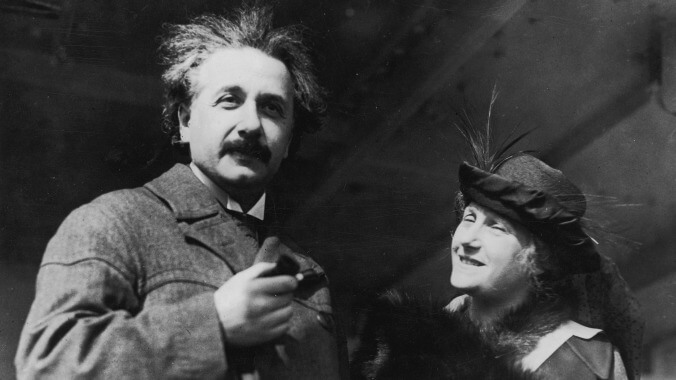Has Oppenheimer made Einstein into a bonafide sex symbol?
The renowned physicist is a ray of sunshine in the oppressively bleak Oppenheimer, but is Einstein also a daddy who is serving?

One of the most famous tongues in history is getting a second look. Albert Einstein, the man responsible for the theory of relativity (which determined that a Princeton eight is a Los Alamos 11) somehow leaves Christopher Nolan’s pitch-black Oppenheimer looking like a hot slab of beef. No one could’ve predicted that the shaggy-haired physicist played by Tom Conti would emerge from the three-hour epic as a boner-fied sex symbol. But if you look at the internet, that’s what’s happening.
A photo of Einstein showing off those getaway sticks of his, posted by the official Einstein social media accounts, is being treated like a Martha Stewart thirst trap. “Feels like summer,” the caption reads, with Einstein sitting at the beach wearing kitten-heel sandals that Wikifeet will love (for the record, Einstein does not have a Wikifeet entry… yet). Many say he’s serving, at least one would “eat his ass.” One thing is sure: people think Einstein is hot.
But this is hardly the first time people have put Einstein’s hot bod over his brain. “I sometimes refer to him as the Jewish Hugh Hefner,” says Benyamin Cohen, author of The Einstein Effect: How The World’s Favorite Genius Got Into Our Cars, Our Bathrooms, and Our Minds. “He’d walk around Princeton in his pajamas and slippers and would be mobbed by fans.”
In life and after death, people have always been obsessed with Einstein
Cohen describes Einstein as the first modern-day celebrity, who was, for a time, the most famous person on the planet—all the more impressive considering very few people understood what the man was talking about. Still, he made himself available to the press because “he knew it was good to be in print.” Even scenes in Oppenheimer of Einstein’s hat flying off his head are based on history. He would throw his hat in the air for the cameras because he knew the press loved it. “Marie Curie never did that,” Cohen said.
“In 1922, he stood out on a balcony in Japan, like he was Michael Jackson, with throngs of people, 10s of thousands of people, outside cheering him on,” Cohen explained. “He would publish a paper, and department stores would put the paper with mannequins in the window, and people would gather around the window like it was the birth of the royal baby.”
Cohen says that Einstein was considered a “ladies man” in his day in part because he had “rough around the edges” looks that Cohen compares to Diego Luna and describes as the originator of “normcore.” “He didn’t care about his looks. He played it down.”
That hasn’t stopped corporations from capitalizing on the public infatuation with Einstein; a resulting battle only reinforced his meme status. In 2009, General Motors released an advertisement that placed Einstein’s head atop the body of an absolutely shredded model. Parodying Mark Wahlberg’s Calvin Klien ads, GM gave their version of Einstein an “E=MC²” shoulder tattoo and the tagline “Ideas are sexy too.” The Einstein-founded Hebrew University of Jerusalem disagreed and sued GM, attempting to prove “Albert Einstein would have transferred his post-mortem right of publicity under New Jersey law had he been aware that such a right of publicity existed at the time of his death.” The university lost the case in 2012. Judge Howard Matz determined in his ruling that, under New Jersey law, “Einstein’s persona has become thoroughly ingrained in our cultural heritage.” Matz continued, “Now, nearly 60 years after his death, that persona should be freely available to those who seek to appropriate it as part of their own expression, even in tasteless ads.”
Einstein was no stranger to being held up as a sex symbol. Einstein lived a horny-on-main lifestyle that would’ve fascinated and disgusted the modern world. He fathered an illegitimate child, divorced his first wife, and married his cousin, wrote NBC’s M. Alex Johnson in 2005. The article also points to Time magazine’s description of Einstein’s thrust into fame, writing, “Ladies swarmed around him like moonlets circling a planet” and describing him as an “egregious flirt.” Even Marilyn Monroe was rumored to have the hots for him. Monroe’s former roommate, actress Shelley Winters, kept that rumor in the air long after Monroe and Einstein’s death. Winters stated that Einstein was on Monroe’s “list.”
“I never got to ask her before she died how much of her list she had achieved, but on her list was Albert Einstein, and after her death, I noticed that there was a silver-framed autographed picture of him on her white piano.”
The shipping of Einstein and Monroe (Monstein? Einroe? Meinstein?) is something of a cultural obsession. Nicolas Roeg’s film 1985 Insignificance, based on a Terry Johnson play of the same name, dramatizes a romantic rendezvous between the two historical figures, imagining a world where they banged. And unlike Oppenheimer, the trailer for Insignificance shows a little tongue.
Attraction to Einstein didn’t necessarily need Oppenheimer. Cohen, who runs the official Albert Einstein social media accounts, says Einstein has 20 million followers on Facebook, more than Tom Hanks or The Rolling Stones. As he appears in the film is how he was in life. He didn’t have an ego and his very presence could elicit excitement, fascination, and awe.
As for the photo of Einstein at the beach, Cohen posts it every summer. “It gets the most engagement of any post all year,” he said. Those aren’t Einstein’s sandals, though. They were his wife’s. Einstein had bunions and hated wearing shoes. Hot.